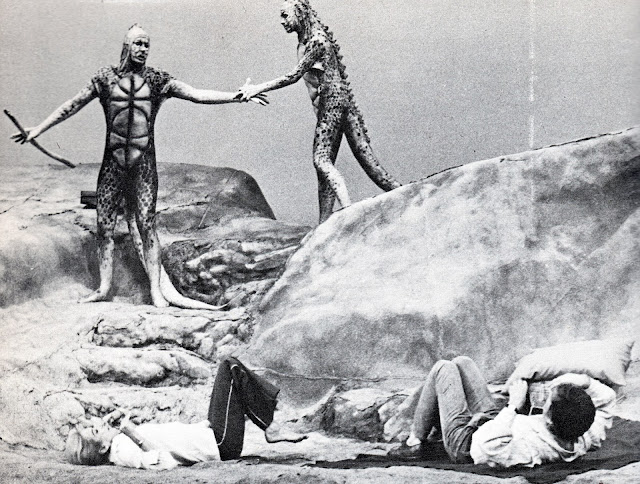 |
| Maureen Anderman, Frank Langella. |
SEASCAPE [Comedy/Animals/Fantasy/Marriage/Sex] A/D: Edward Albee; S/L: James Tilton; C: Fred Voelpel; P: Richard Barr, Charles Woodward, Clinton Wilder; T: Sam S. Shubert Theatre; 1/26/75-3/22/75 (65)
 |
| Deborah Kerr, Barry Nelson. |
Edward Albee won the Pulitzer Prize for this fanciful
allegory, but few critics would have supported the decision to grant him the award, even though Clive Barnes’s Times review
was headlined: “Seascape Is a Major Event.”
Nancy (Deborah Kerr) and Charlie (Barry Nelson) are
attractive, youngish grandparents lounging on a beach and discussing life both in
general and in particular. Every now and then a military jet roars overhead.
Ennui has settled in. Charlie’s main ambition is to do nothing. Nancy’s is to
go from one beach to another around the world. He recalls his secret teenage
habit of sinking to the sea’s bottom, stones in his hands, and remaining there
as long as possible. Their relationship is passive; sex is in retirement. Their
kids have grown up and left the nest. An air of mild acrimony mars their
discourse.
 |
| Maureen Anderman, Frank Langella, Deborah Kerr, Barry Nelson. |
Then, as act one nears its end, a pair of strangers enters:
two huge lizards with powerful lashing tails. The husband lizard is Leslie
(Frank Langella), the wife Sarah (Maureen Anderman). They speak a highly
educated-sounding English. Leslie and Sarah have come up from the sea for a
breath of air and soon they and Nancy and Charlie are conversing about the
differences between amphibian and human sex organs, married life, and so on.
Charlie almost frightens the reptilian pair back into the
ocean with his comments about death, but this hurdle is cleared and Leslie and
Sarah are convinced to remain on land and participate in their evolutionary
duties. The play closes on Leslie’s tag: “Begin.” (Do I hear an echo of this at the end of Angels in America?)
Barnes was the play's strongest supporter. Seascape, he wrote, is “a curiously
compelling exploration into the basic tenets of life” in which “the tone of the
writing is always thoughtful, even careful, even philosophic,” thereby helping
to create “a play of great density, with many emotional and intellectual
reverberations.” Bleaker opinions prevailed, however, as in Douglas Watt’s
belief that there was “nothing especially stimulating about the occasion.” He
thought the language was “more literary than dramatic. . . . The dialogue is
urbane, occasionally witty, but stiff and artificial-sounding.” This view was
shared by many.
“Albee seems drained of almost all vitality—theatrical,
intellectual, artistic,” griped Jack Kroll, while John Simon called Seascape a work of “doughy verbiage,
feebly quivering inaction, and grandly gesticulating pretentiousness.”
The play’s meaning was disputed, Simon, for instance, saying
that the lizards could represent “underprivileged minorities, upward mobility, élan
vital . . . ; the human beings . . . the bourgeoisie, the declining West, the
Establishment.”
Whatever its meaning, Seascape went under in two months.
Seascape was Albee’s first stab at directing his plays on Broadway; there was little argument over the acceptable quality of his staging. Movie star Deborah Kerr (returning to Broadway after a long absence) and Barry Nelson (one of Broadway's most reliable leading men) gave their usual high-quality performances, but the actors playing the creatures captured the most attention, especially Langella in his Broadway debut. His reptilian movements and expressive voice, despite his being encased in a costume covering him from head to foot, stole the show, as Watt declared.
Barnes had this to say of
Langella and Anderman:
To my amazement I note from the
playbill that this is Frank Langella's Broadway debut—he is among our most
distinguished young actors, and Broadway should be ashamed of itself. It would
be so easy to play a lizard as sort of Demon King or Godzilla, but Mr. Langella
plays him precisely as one of those animals you have always longed to
communicate with but never had the language. His partner, Maureen Anderman, is
also superbly lizardlike, but as humanly feminine as Mr. Langella is humanly masculine.
In addition to the Pulitzer, Seascape won the Elizabeth Hull-Kate Warriner Award, and was
nominated for a Tony. Langella won the Tony for Best Featured Actor, while garnering the
Drama Desk Award for Supporting Actor. James Tilton was granted a Tony
nomination for Best Lighting Designer.